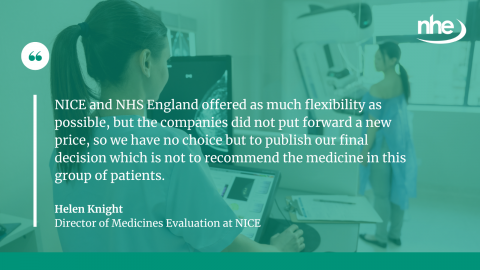The National Institute for Health and Care Excellence (NICE) has confirmed it will not recommend trastuzumab deruxtecan — otherwise known as Enhertu — as a treatment for the NHS, following a failure to agree a cost effective price with industry partners Daiichi Sankyo and AstraZeneca.
Enhertu is the first breast cancer medicine NICE has chosen to not recommend in six years, breaking a line of 21 straight positive decisions.
NICE’s medicines evaluation director, Helen Knight, said: “NICE and NHS England offered as much flexibility as possible, but the companies did not put forward a new price, so we have no choice but to publish our final decision which is not to recommend the medicine in this group of patients.”
Enhertu is a targeted treatment for HER2-low metastatic or unresectable breast cancer after chemotherapy — it is the first licensed targeted treatment for this kind of breast cancer. Around 1,000 people were expected to benefit from Enhertu if the green light came from NICE.
Despite the decision, NICE has confirmed that a new decision could be reached “within weeks” if the industry partners are willing to drop their price to something NICE considers good value for money for the taxpayer. Enhertu was accepted for use across NHS Scotland last December.
“As we’ve always made clear, the fastest and only guaranteed way to get medicines like Enhertu to the patients who need them is for companies to offer a fair price,” added Knight.
NICE provisionally rejected the drug last September, but discussions were paused in December 2023 while NICE negotiated with industry.

This concluded in March when an agreement could not be reached, however a Health and Social Care Committee session led to NICE postponing final guidance allowing for extra discussions after campaigning from the third sector.
In its published guidance, NICE has said: “Despite accounting for the condition's severity, by applying a severity modifier, and accounting for innovation and uncaptured benefits, the most likely cost-effectiveness estimate are above the upper end of the range NICE considers an acceptable use of NHS resources.
“So, trastuzumab deruxtecan is not recommended.”
The severity modifier replaced the end-of-life modifier in 2022 so a wider range of treatments could be given extra weight during the appraisal process.
Some parties have expressed concern that the switch has had an impact on NICE’s appraisal process. The severity modifier is being monitored and an evaluation of its use is ongoing, according to NICE.
Breast Cancer Now's interim CEO, Rachael Franklin, described the decision as an "avoidable tragedy." She added: "We’re hugely concerned that the introduction of the severity modifier, as part of changes to NICE methods in 2022, will lead to other effective treatments for secondary breast cancer being rejected by NICE.
"We simply cannot afford for this to happen given what’s at stake. NICE’s review of the severity modifier must be open and transparent — involving patient organisations — and crucially lead to the urgent change needed to ensure people with secondary breast cancer never find themselves in this unacceptable position again."
Despite being “deeply disappointed” with the outcome of the appraisal, Knight has thanked the breast cancer community for its hard work.
NICE’s chair, Sharmila Nebhrajani OBE, recently wrote for the National Health Executive digital magazine, explaining how her organisation will drive unparalleled change over the next 25 years. Click here to read more.
Image credit: iStock



















